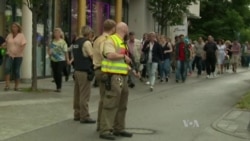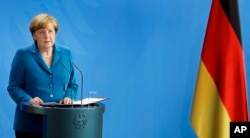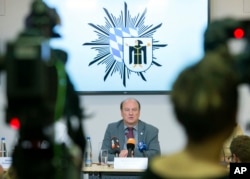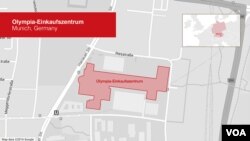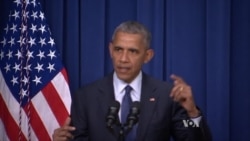German investigators say the gunman who killed nine people in Munich Friday spent more than a year preparing for the attack.
An 18-year-old German-Iranian man identified as David Ali Sonboly, who opened fire Friday night in a crowded shopping mall in Munich, was “obsessed” with mass shootings, German officials said Saturday. The gunman killed himself after the attack.
Investigators said they searched the suspect's apartment and have not found any links to terrorism, but instead believe the attack was a "classic shooting rampage," citing a book found in his room entitled "Rampage on my Mind — Why Students Kill."
They also say the attack was not linked in any way to the recent influx of asylum-seekers that has been the topic of a heated debate in Germany.
Interior Minister Thomas de Maiziere told reporters Saturday that evidence showed that the shooter had researched a 2009 school shooting in Germany, and the bomb-and-gun attacks in Norway by Anders Behring Breivik, who killed 77 people five years ago Friday.
De Maiziere said that there has been no indication of any connection to international terrorism.
Authorities are still trying to determine a motive, and de Maiziere said they were investigating reports that the shooter had been bullied by his peers.
He said that Sonboly had likely used a hacked Facebook account to lure people to a McDonald's restaurant, "offering them special reductions."
All those killed by Sonboly were Munich residents and most were teenagers.
At least 16 people, including children, were in the hospital and three were in critical condition, Bavarian police said Saturday morning.
Speaking to reporters Saturday in Berlin, after a special meeting of her government's security council, Chancellor Angela Merkel said that German security services will “do everything possible to protect the security and freedom of all people in Germany” in the wake of two attacks in less than a week.
"Ladies and gentlemen, we will find out what exactly lay behind the crime in Munich. We will not rest until we have precise knowledge about how the perpetrator of the Wuerzburg [ax] attack became radicalized," she said. "The state and its security services will continue to do all they can to protect the safety and freedom of all people in Germany. Thank you."
Merkel said that Friday night's deadly rampage in Munich, which she called “a night of terror,” and Monday’s attack on board a train in Wuerzburg were carried out in “places where any of us could have been” and have left Germans wondering “where is safe?”
Combined with the deadly attack in the French city of Nice, she said, people are growing increasingly concerned.
Bavarian State Prime Minister Horst Seehofer said at a press conference Saturday that Friday’s attack at a Munich shopping mall was a hard blow to German society.
"What happened yesterday in Munich fills us all with grief and horror, coming only days after the attack in Wuerzburg," Seehofer said. "The murders yesterday in Munich are a cruel blow for all of us across Bavaria. Our thoughts are with the victims of this barbaric act, and I want to express the condolences of the Bavarian government to their loved ones."
Seehofer told reporters that there was no known motive for the attack.
The killer was born and raised in Munich, and was in psychiatric and medical care. Investigators say they believe he was "deranged."
The teenager committed suicide, shooting himself in the head amid the havoc he caused Friday, according to Munich Police Chief Hubertus Andrae. There was no word on what triggered the young man's attack.
The perpetrator was said to have had a 9 millimeter Glock 17 handgun, which police believe was illegal because a serial number had been scratched off. Authorities said they are working to reveal the number so they can track where the weapon was acquired.
The police chief said all security restrictions imposed Friday evening have now been lifted. He told reporters at a Saturday morning news conference that investigators concluded the German-Iranian teenager was the lone gunman based on an intensive review of video from security cameras that monitor all activity in the area where the shootings took place — at the McDonald's restaurant and in the nearby Olympia Shopping Mall.
Rumors that swept through Munich about a trio of attackers shooting civilians with rifles all were false, the police chief said.
Investigators have been trying to determine how many shots the 18-year-old gunman fired, Andrae said, but that effort will take time because of the large area that became a shooting scene.
Iran's Foreign Ministry spokesman, Bahram Ghasem, condemned the attack in a statement, saying "today, fighting against terrorism, in any form and anywhere, is an urgent demand of the world community." He added that "killing innocent and defenseless people has turned into a shame on the history of mankind."
French President Francois Hollande has expressed his condolences and support for Germany after the Munich attack, calling it an “ignoble act aimed at spreading horror in Germany.” The country will stand up to this, Hollande said. "It can count on France's friendship and cooperation.''
U.S. President Barack Obama expressed sorrow over the casualties when he appeared before a gathering of law-enforcement officials at the White House late Friday. "Our hearts go out to those who may have been injured," Obama said, and pledged all possible support to Germany, since it is one of the United States' closest allies.
WATCH: Obama statement on Munich shooting
An American bystander in Munich who declined to give his name told VOA he was at a train station when the shooting began.
"Initially it was pretty, pretty scary at the train station," the man said. "People just started rushing in," and the atmosphere was full of fear.
Then it fell silent outside, the American man said, and even more people rushed into the station to find safety. All rail service in Munich was immediately suspended and the station was closed, but the panicky crowd managed to find a way in.
Hours later, the city remained on lockdown, the American bystander told VOA, with a large force of police patrolling the area and surveying the scene from helicopters.
The police chief said 2,000 officers — from the city police, federal police and special forces — took part in the security sweep. The public was asked not to photograph or film police activity in order to avoid divulging information that could be useful to an attacker. At that point, police still were hunting for up to three suspects.
Police also sent frequent messages via Twitter and Facebook advising residents to stay at home and urging those who were out in the city either to avoid public spaces or take shelter in protected buildings.
Friday's attack took place four days after a 17-year-old Afghan refugee attacked passengers with an ax and a knife on a train in the German city of Wuerzburg. The teenager wounded four people before police shot him dead. Islamic State later claimed responsibility for the attack.
Watch: Mobile phone footage of shooter
In late June, a masked man opened fire at a German movie complex in the western town of Viernheim, near Frankfurt, wounding several people. Special police officers shot him dead and freed several hostages.
Stephen Szabo of the Transatlantic Academy at the German Marshall Fund of the United States, told VOA the Wuerzburg attack, followed by the Munich shootings, will focus new scrutiny on Germany's policy of accepting refugees fleeing world trouble spots. Chancellor Merkel's open policy on refugees is "very different than the policies you've seen in France and Belgium," Szabo said. "...It means that the political ramifications are going to be pretty strong against her and against this open-door policy."
The analyst also said the two attacks could be considered harbingers of difficult times to come. "This could be the beginning of a serious internal terrorist threat in Germany, which they've expected," Szabo said. "Everybody expected something to happen in Germany over the last year."
VOA's Elizabeth Cherneff, Isabela Cocoli, Ira Mellman and Fern Robinson contributed to this report.




